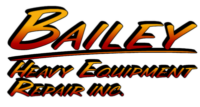What Is Mobile Welding?
When you think of welders, you’re probably picturing someone working in a fabrication shop. However, mobile welding services exist. How can welding be mobile—and how does it work?
One common use for mobile welding involves heavy equipment repair. If you can’t haul your equipment to a service center, you’ll need to call a mobile welder. They’ll come to your location and perform the necessary repairs, using special equipment to power the welding tools.
Here’s how mobile welding works.
Mobile welding equipment
You might be familiar with traditional welding equipment, which is usually used in the confines of a workshop. The actual welding guns, protective equipment and welding supplies are the same as what’s used in a mobile welding situation. However, the power supply is different.
Instead of plugging mobile welding equipment into an AC outlet, mobile welders have to find other solutions. Most commonly, this involves a gas-powered generator. The generator has to be able to meet or exceed the welding equipment’s needs, which can make them quite loud. They often use mufflers to cut down on the amount of noise produced.
Gas-powered welding machinery doesn’t take up a lot of physical room, but it can be heavy. Some welding equipment (including the generator) weighs 600 pounds or more. This requires the use of a trailer to transport the welding equipment to remote locations.
There are also “portable” welding generators and equipment, which can produce about 10 to 12 welds on one charge. Some of these weigh as little as 31 pounds, making them suitable for hard-to-reach or elevated areas.
Safety considerations
Mobile welding also involves different safety considerations. The welder will use all the regular protective gear they’d wear in a fabrication shop. However, they also need to be conscious of their surroundings. Between vegetation and other flammable material, there’s potential for serious damage. That’s why mobile welders spend a lot of time cleaning up the site and the equipment—before and after the repairs are completed.
Equipment repairs
One popular type of mobile welding is equipment repairs. After all, when your tractor breaks down, loading it onto a trailer (if you own one) is going to be difficult. Alternatively, you could pay someone to come tow it for you, but that can get expensive. Having a mobile welder come out and perform the repairs on-site is a convenient and easy solution for everyone involved, and means you’ll save both time and money on the repair.
Now that you know how welding can be mobile, be sure to consider this option for your next repair needs. Your mobile welder should be trained in using mobile power sources as well as the best safety practices. This will ensure you get the repairs you need, with no added complications.
The team at Bailey Heavy Equipment Repair, Inc. can help you with all your heavy equipment mobile welding needs. When you need safe, reliable and expert welding services, our team is ready to help. Call us today to learn more and get a quote.
